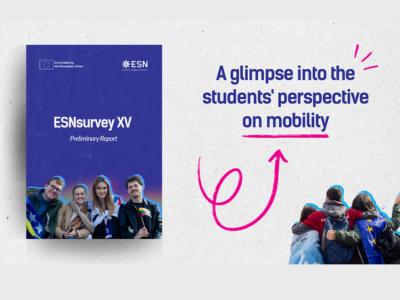Now available: preliminary results of ESN’s 15th Edition Survey on Student Exchanges and Erasmus+
21 September 2023 | From partners

The initial findings from XV ESNsurvey, the largest student-led study dedicated to student exchanges and the internationalisation of Higher Education, have been revealed, providing valuable insights into the student perspective on mobility programs. The preliminary report was launched in light of the ongoing midterm evaluation process of the Erasmus+ programme.
Over a period of two months, the XV ESNsurvey collected 17,855 answers from exchange students, 1,856 answers from full-degree students and 3,064 from non-mobile students.
The preliminary report provides valuable insights into the experiences and perspectives of mobile, full-degree, and non-mobile students, between 2021 and 2023, shedding light on areas of improvement and opportunities for enhancing international mobility programs and European values. One important highlight is the positive impact of the implementation of the Erasmus+ 2021-2027 priorities, especially the inclusion one, with 36% of respondents agreeing, and 46% strongly agreeing with these measures.
Another standout point is the evidence that Erasmus+ for studies stands out as the most well-known initiative, indicating a need for increased awareness about other programme opportunities.
The report also provides key findings regarding exchange students on pre-departure support, the challenges faced by students the state of play of grants, and credit recognition.
Below, you will find a summary of the main conclusions of the preliminary report. The final report is scheduled for launch in December.
Summary of conclusions from XV ESNsurvey’s preliminary report
Mobile Students:
- Erasmus+ Priorities: Approximately 50% of respondents feel that the inclusion measures in the Erasmus+ program are well-implemented.
- Pre-departure Support: 82% of students expressed a need for more financial support before their departure.
- Means of Transport: Flying remains the most popular mode of transportation to and from mobility destinations, while buses are preferred for in-country trips.
- Challenges: Common challenges include a lack of funding, difficulty finding affordable accommodation, and issues with course matching.
- Satisfaction with Universities: Students generally report satisfaction with the services provided by Higher Education Institutions, although dissatisfaction has slightly increased.
- Timely Payment of Grants: More students are receiving grants on time, with a rise from 32.92% to 36.8%.
- Digitalization: Students without access to online processes are dissatisfied with the administration of their mobility experience.
- Recognition of Credits: 42% of students reported course changes during their exchange, highlighting the need for continuous automatic credit recognition.
Full-Degree Students:
- Funding: A significant portion of respondents (38.9%) self-funded their international experience, while others received substantial funding (21.8%).
- Recognition of Credits: Over 45% of respondents faced difficulties in getting their degrees recognized, but the same percentage had no issues.
Non-Mobile Students:
- Motivations: Hearing from students who have experienced mobility was a motivating factor for non-mobile students.
- Erasmus+ Knowledge: The Erasmus+ for studies program is the most well-known, followed by International Credit Mobility and Erasmus+ Traineeships.
- Barriers: Financial restrictions were the main barrier to participating in student mobility.
Students as Multipliers of European Values:
- Identity: After their mobility experience, a significant portion of students strongly identified as global citizens (48%), European citizens (50%), and with the European Union (47%).
- Intentions to Vote: Mobile students showed high engagement in European Parliament elections, with 66% intending to vote.
Dowload the report HERE or read it at ESN’s website.
What about university staff?
The future of Erasmus+ is shaped by all! This includes administrative staff, which are crucial in the management of mobilities.
If you’re part of the UNICA IRO Working Group, we want to hear your thoughts on the future of Erasmus+. We are conducting a survey to allow UNICA members to voice their opinions/ideas about the current Erasmus+ programme and its future. IRO group member, Dr. Ibrahim Yorgun, from METU, will present the survey results to the KA131 Higher Education Working Group. This is an group was created by the European Commission with the goal of enhancing the effective execution of future higher education Erasmus+ initiatives funded by internal policy funds (KA131).
For more details on how to access the survey, please contact laura.brossico@unica-network.eu


 Co-funded by the European Union. Views and opinions expressed are however those of the authors only and do not necessarily reflect those of the European Union or the European Education and Culture Executive Agency (EACEA). Neither the European Union nor the granting authority can be held responsible for them.
Co-funded by the European Union. Views and opinions expressed are however those of the authors only and do not necessarily reflect those of the European Union or the European Education and Culture Executive Agency (EACEA). Neither the European Union nor the granting authority can be held responsible for them.